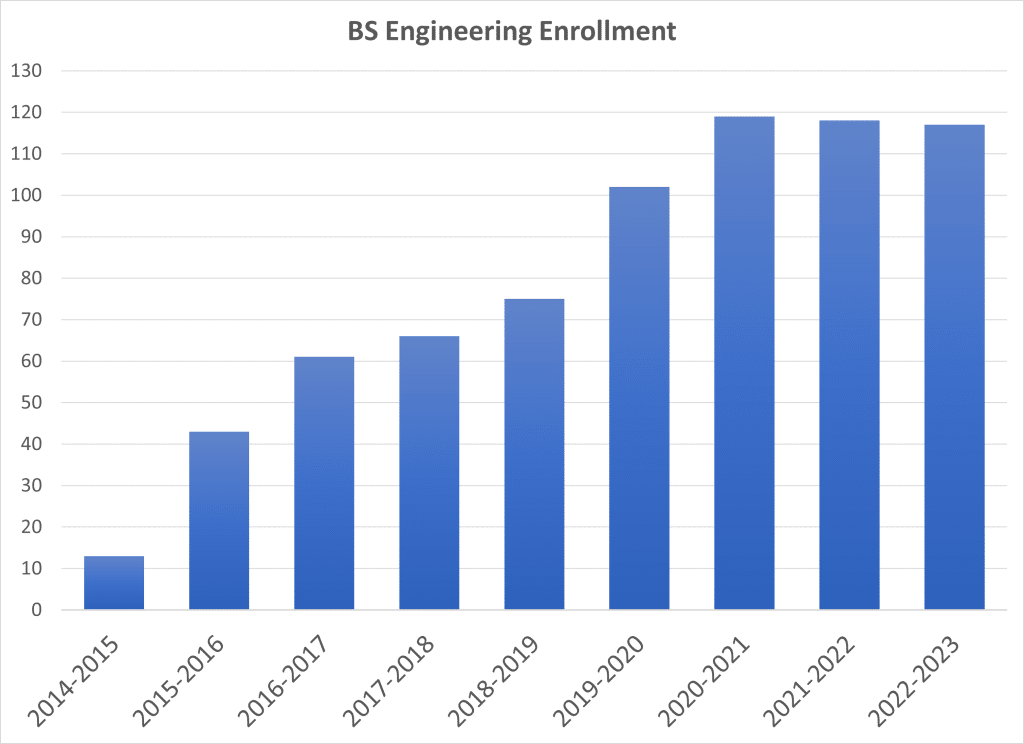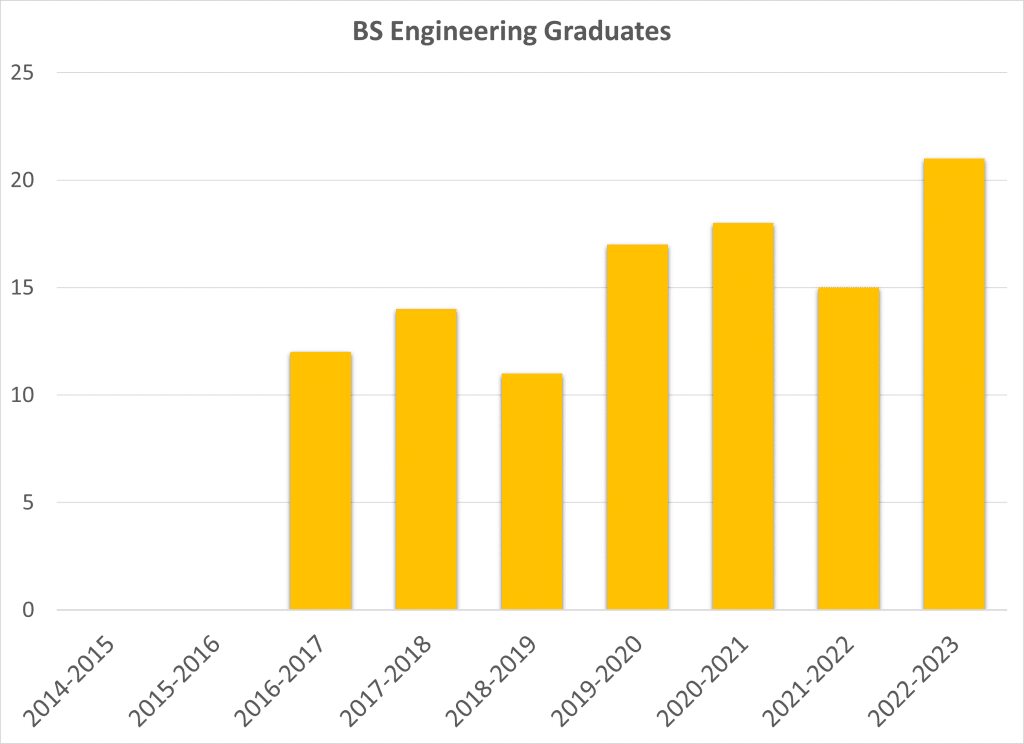| Department: | |
| Hours Required: | 124 |
| Categories: | Major, Undergraduate |
| Delivery: | On-Campus |
The Engineering (BSEngr) program is accredited by the Engineering Accreditation Commission of ABET, https://www.abet.org, under the commission’s General Criteria and Program Criteria for Engineering, General Engineering, Engineering Physics, and Engineering Science.. It is housed in a dedicated, state-of-the-art facility near a newly renovated dormitory reserved in part for science majors. Courses emphasize solving engineering problems and obtaining practical experience through internships. The baccalaureate degree provides a broad background in mechanics of materials, structures and control systems. Our engineering program enjoys a unique partnership with local industries; real-world engineering problem‐solving is enhanced by practical experience our majors receive through industry internship opportunities. The students are also required to work on a senior capstone engineering design project overseen by a faculty member.
Program Educational Objectives
Within three to five years of graduation, after obtaining a four-year general engineering degree from Southern Arkansas University, graduates should:
- Apply the fundamental knowledge of engineering design skills and problem-solving skills to advance professionally and intellectually in their careers beyond the entry-level in the field of engineering,
- Be effective citizens and contributors to free and democratic society through the use of technical, ethical, social, leadership, and communication skills, and
- Be life-long learners by engaging themselves in professional activities in the field of engineering
Student Outcomes
- An ability to identify, formulate, and solve complex engineering problems by applying principles of engineering, science, and mathematics
- An ability to apply engineering design to produce solutions that meet specified needs with consideration of public health, safety, and welfare, as well as global, cultural, social, environmental, and economic factors
- An ability to communicate effectively with a range of audiences
- An ability to recognize ethical and professional responsibilities in engineering situations and make informed judgments, which must consider the impact of engineering solutions in global, economic, environmental, and societal contexts
- An ability to function effectively on a team whose members together provide leadership, create a collaborative and inclusive environment, establish goals, plan tasks, and meet objectives
- An ability to develop and conduct appropriate experimentation, analyze and interpret data, and use engineering judgment to draw conclusions
- An ability to acquire and apply new knowledge as needed, using appropriate learning strategies
- An ability to use the techniques, skills, and modern engineering tools necessary for engineering practice
Enrollment and Graduation Data
University Requirement (2 hours)
GSTD 1002 – Freshman Seminar
General Education (18 hours)
English Composition (6 hours)
Fine Arts/Humanities (6 hours)
U.S. History/Government (3 hours)
Social Science (3 hours)
Note: 17 hours of mathematics, biological science, physical science, social science, and fine arts/humanities requirements are included in the major.
Engineering (62 hours)
ENGR 1023 – Introduction to Engineering and ENGR 1021 – Introduction to Engineering Lab
ENGR 1212 – Engineering Graphics
ENGR 2033 – Electrical Circuits I
ENGR 2043 – Properties of Materials
ENGR 2143 – Statics
ENGR 2163 – Dynamics
ENGR 3003 – Fluid Mechanics
ENGR 3013 – Thermodynamics
ENGR 3023 – Heat Transfer
ENGR 3043 – Mechanics of Materials
ENGR 3073 – Engineering Economics
ENGR 3083 – Numerical Methods in Engineering
ENGR 3101 – Solid Mechanics Lab
ENGR 3211 – Thermal Fluid Science Lab
ENGR 3143 – Manufacturing Processes
ENGR 3163 – Computer-Aided Design and Analysis
ENGR 4013 – Machine Design
ENGR 4023 – Senior Design Project I
ENGR 4123 – Senior Design Project II
ENGR 4033 – Control Systems
ENGR 4153 – Heating, Ventilation, and Air Conditioning
ENGR 4701 – Work Experience Learning I
ENGR 4992 – Engineering Proficiency
ENGR 2020 – Engineering Exams *
*Engineering students must register for this course each fall and spring semester. It will be used as an exam period for all Engineering and Physics courses at the sophomore level and above.
Chemistry (8 hours)
CHEM 1023 – University Chemistry I and CHEM 1021 – University Chemistry I Lab
CHEM 1123 – University Chemistry II and CHEM 1121 – University Chemistry II Lab
Computer Science (4 hours)
CSCI 2103 – Computer Science I and CSCI 2101 – Computer Science I Lab
Mathematics (16 hours)
MATH 1525 – Calculus I
MATH 1545 – Calculus II
MATH 2563 – Calculus III
MATH 3033 – Differential Equations
Physics (8 hours)
PHYS 2203 – University Physics I and PHYS 2201 – University Physics I Lab
PHYS 2213 – University Physics II and PHYS 2211 – University Physics II Lab
Other Requirements (6 hours)
ENGL 3023 – Technical Writing
3 hours of upper-Level Physics or Engineering electives
Total Hours – 124

The Engineering Accreditation Commission (EAC) of ABET is the specific commission within the ABET organization responsible for accrediting college and university programs that prepare students for the professional practice of engineering at the baccalaureate and master’s degree levels. It’s a peer-review process that evaluates programs against established quality criteria, ensuring that graduates are prepared for the technical demands of their profession and ready to enter the workforce.


